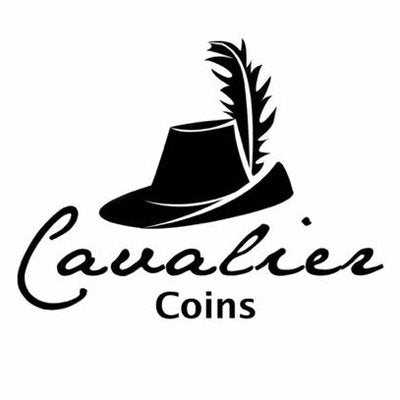Before you even think about where to sell your coin collection, you need to know exactly what you’ve got. This isn't a step you can skip; it's the bedrock for getting a fair price and navigating the market without getting taken for a ride. If you don't have a clear inventory and a basic handle on your coins' condition, you're flying blind.
Your First Steps Before Selling a Coin Collection
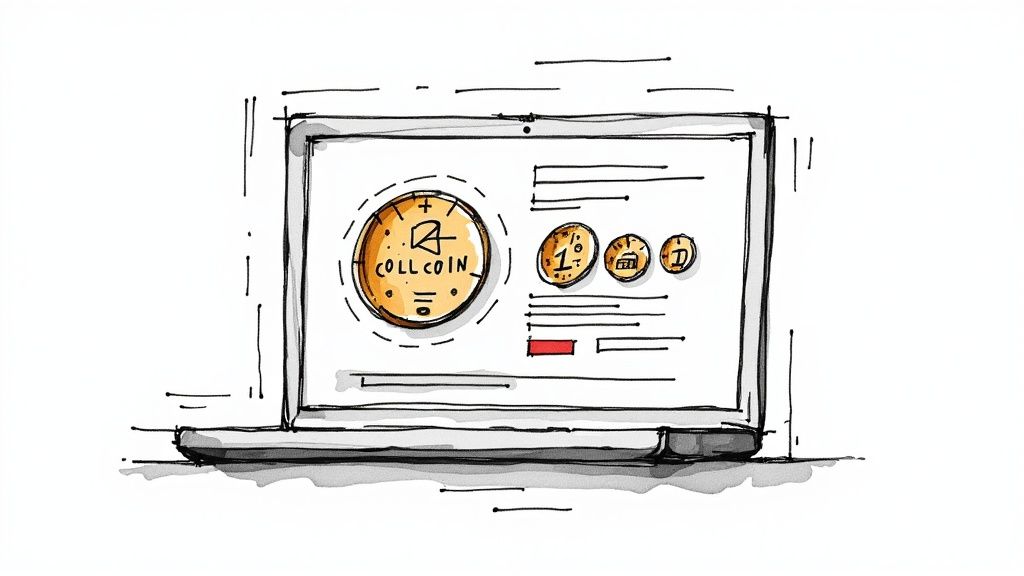
It’s tempting to just dive in and try to sell, but that's a classic mistake that can cost you a lot of money. A jumbled box of coins is just chaos, both for you and for anyone trying to buy them. Taking the time to get organised is the first real step in turning that chaotic pile into a valuable asset.
Get Everything Organised and Inventoried
First things first, sort your coins into logical piles. This simple bit of housekeeping brings immediate clarity and makes the entire collection much easier to deal with. Don't even think about value at this point – just focus on creating order from the chaos.
A good way to start is by separating them by:
- Country of Origin: Put all the British coins in one group, American in another, and so on.
- Metal Type: Pull out the gold, silver, and copper coins. This is crucial, especially for any bullion you might have.
- Denomination and Year: Once grouped by country, sort them by face value (all the pennies together, all the shillings) and then pop them in chronological order.
With everything sorted, create a simple spreadsheet or even just a handwritten list. Log the year, denomination, country, and any obvious markings for each coin. This inventory will be your single most powerful tool when you start talking to buyers.
Be Honest About the Condition
A coin's condition, or its "grade," is one of the single biggest drivers of its value. Think about it: a 1933 penny in mint condition is worth a fortune, while one that's been rattling around in pockets for decades is not. You don't need to be a professional grader, but you do need to understand the basics.
Look at each coin. Is the design crisp and sharp, or are the features worn down and smooth? Check for scratches, dings on the rim, or any tell-tale signs of cleaning – these can absolutely tank the value. Just being able to confidently describe a coin as "well-worn" versus "nearly uncirculated" puts you in a much stronger position.
A detailed inventory, paired with an honest assessment of each coin's condition, gives you the leverage you need in any negotiation. It tells a potential buyer you’re serious and you know what you have.
Think About Professional Grading for Your Best Coins
For most of your collection, professional grading probably isn’t worth the cost. But, if your own research flags a coin as particularly rare or valuable – say, a key-date Sovereign or a scarce commemorative piece – getting it graded can be a game-changer.
Companies like the Numismatic Guaranty Company (NGC) or Professional Coin Grading Service (PCGS) will authenticate and grade your coin, then seal it in a protective slab. This removes any guesswork about its authenticity and condition, making it far easier to sell for its true market price. For serious collectors and auction houses, that slab provides undeniable proof of quality, often resulting in significantly higher offers.
How to Determine Your Coin Collection's Value
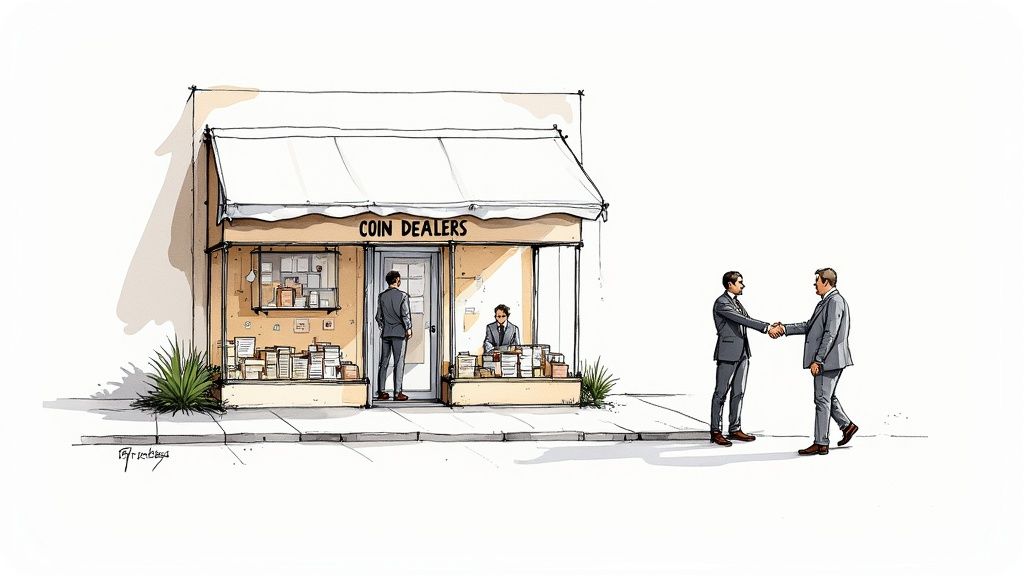
Before you even think about where to sell your coin collection, figuring out what it’s actually worth is the most important move you can make. It’s the difference between being a hopeful seller and an informed one, giving you the power to negotiate a fair price and walk away from lowball offers. Guesswork just won't do.
The good news? You don't have to be a seasoned numismatist to get a solid estimate. Many of the tools the professionals use are available to you. A great starting point is a reputable print guide like the Spink 'Coins of England & the United Kingdom' catalogue. It's often called the bible for UK coin collectors for good reason—it gives you benchmark values for British coins in all sorts of grades.
Online resources have also made this initial research far easier. Websites that archive past auction results are goldmines of information, showing you what similar coins are actually selling for right now.
Identifying the Key Value Drivers
A coin's price isn't pulled out of thin air. It’s determined by a clear set of factors that drive demand in the market, and understanding these is the key to a realistic valuation.
Here's what you need to be looking for:
- Rarity: How many were ever minted? A coin from a year with a low mintage is almost always more valuable than its more common cousins.
- Condition (Grade): As we’ve mentioned, a pristine, uncirculated coin will always fetch a much higher price than one that’s been heavily knocked about. Even the smallest details can make a big difference.
- Historical Significance: Does your coin mark a major event or come from a short, turbulent reign? Coins with a story to tell often grab more attention from buyers.
- Bullion Content: For gold and silver coins like Sovereigns or Britannias, their value is fundamentally tied to the live market price of the metal they contain.
Take the famous 1933 Penny, for instance; its incredible rarity makes it one of Britain's most sought-after coins. On a less dramatic scale, a tiny mint mark can be the only thing separating a common coin from a scarce variety worth hundreds more. You can dive deeper into these details with our guide on expert coin collection valuation tips for UK coins.
When a Professional Appraisal Is a Smart Move
Doing your own research is invaluable, but there are times when you simply need a professional eye. If your homework suggests you’re sitting on a few high-value pieces or something exceptionally rare, getting a formal appraisal is a very wise move.
An appraisal from a certified expert provides an authoritative valuation that carries real weight with top-tier buyers and auction houses. Think of it as an investment that can pay for itself many times over.
For this, you’ll want to find a reputable numismatist. The best place to begin your search is the British Numismatic Trade Association (BNTA). Its members are properly vetted and follow a strict code of ethics, so you can trust you’re getting an honest, accurate assessment. This expert opinion gives you a firm price range to aim for when you decide to sell.
The UK coin market is incredibly active and continues to grow, with British collectors contributing to a significant chunk of the £1.5 billion European market. Knowing what your collection is worth is the first step to taking your place in it.
Comparing The Best Venues To Sell Your Coins
Right, you’ve got a solid idea of what your collection is worth. Now comes the big decision: where do you actually sell it? This isn’t a one-size-fits-all answer. The best place depends entirely on what kind of coins you have, how quickly you need the cash, and how much legwork you’re prepared to do yourself.
In the UK, you’ve really got four main routes: specialist coin dealers, big auction houses, online marketplaces, and local collector fairs. The path you choose will have a direct impact on the final price, how fast the whole process is, and how much of your own time it takes up. Getting this part right is crucial.
UK Coin Selling Venues: A Quick Comparison
To help you decide, let's look at the main options side-by-side. Each one has its own set of pros and cons, and what works for a collection of Roman denarii might not be the best fit for a set of modern commemoratives.
| Selling Venue | Potential Price | Sale Speed | Typical Fees | Best For |
|---|---|---|---|---|
| Specialist Coin Dealer | Lower (Wholesale) | Very Fast (Often same day) | None (Built into offer) | Quick, hassle-free sales; lower-value collections. |
| Major Auction House | Highest (Retail+) | Slow (3-6+ months) | 15-25% Seller's Premium | High-value, rare, or historically important coins. |
| Online Marketplace (eBay) | High (Retail) | Variable (Days to weeks) | ~10-15% (Platform + payment fees) | Sellers who want control and are happy to do the work. |
| Local Collector Fair | Variable | Fast (On the day) | Small (Table fee) | Common coins; sellers who enjoy face-to-face deals. |
As you can see, there's a clear trade-off between price, speed, and convenience. Your personal priorities will steer you toward the right choice.
Specialist Coin Dealers For Speed And Simplicity
Walking into a reputable coin dealer is often the quickest and simplest way to turn your collection into cash. You can present your coins and, more often than not, walk out with an offer on the spot. It’s this convenience that makes it such a popular option for people who just want a straightforward sale.
Of course, this speed comes at a price. A dealer has to make a profit, so they’ll offer you a wholesale price, which is naturally less than the coin’s full retail value. You get your money straight away, but you might be leaving some on the table. In fact, around 35% of UK coin sellers choose local shops precisely for this convenience, despite prices often being 10-20% lower than you might get at auction. For more on UK collector habits, Change Checker is a great resource.
Auction Houses For Maximising Value
If you're sitting on high-value, rare, or historically important coins, a major auction house is almost always your best bet. Big names like Spink or Dix Noonan Webb in London have a global Rolodex of serious collectors ready to compete for top-tier items. This is where you see bidding wars erupt, sometimes pushing the final price well beyond anyone's expectations.
The trade-off? Time and money. The entire process, from getting your coins catalogued to the day of the auction, can easily take several months. Auction houses also charge a seller's commission—usually a percentage of the final hammer price—which you need to account for.
Deciding between a major auction house and a smaller, local one often comes down to weighing up reach against fees. The big players offer a worldwide audience, while a local auction can be a faster and cheaper route for less spectacular collections.
This image neatly sums up the key differences you’ll find between the two auction types.
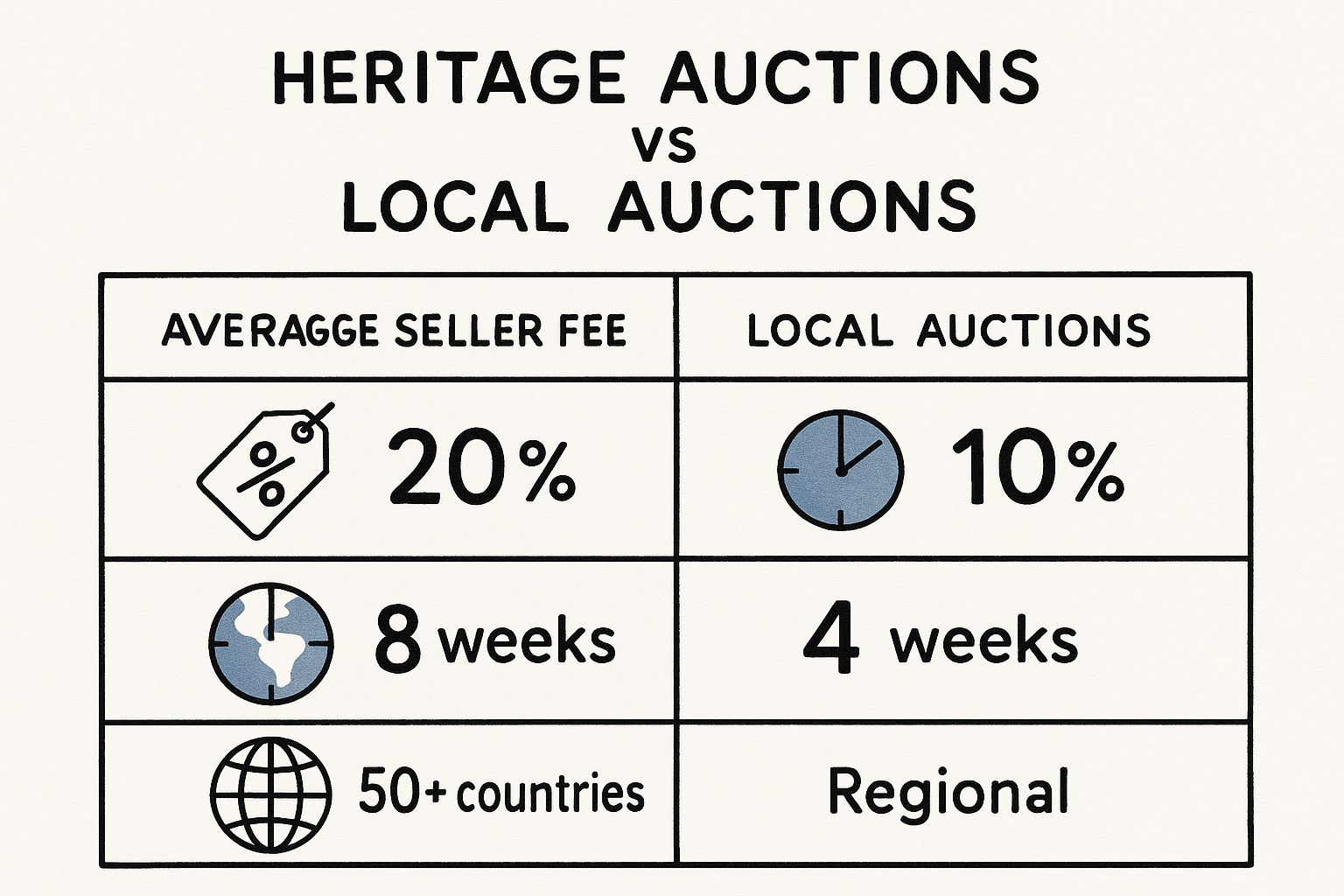
As the data makes clear, the global stage of a major auctioneer involves higher fees and a longer wait, whereas a local sale is quicker but plays to a much smaller crowd.
Online Marketplaces For Greater Control
Platforms like eBay put you firmly in control. You write the listing, you set the price, and you deal directly with the buyers. If you have the time and patience to manage it all, this can be a fantastic way to achieve full retail prices for your coins.
Be warned, though: this control means you’re doing all the work. You’ll be responsible for:
- Photography: Taking sharp, clear photos that do your coins justice.
- Listing Creation: Writing accurate and appealing descriptions.
- Customer Service: Fielding questions from potential buyers.
- Shipping: Packing everything securely and getting it posted once it's sold.
And while you dodge the dealer's cut, you'll still have to pay platform fees and payment processing charges. If you want to dive deeper into selling online, take a look at our guide on how to sell a coin collection.
Getting Your Coins Ready to Impress
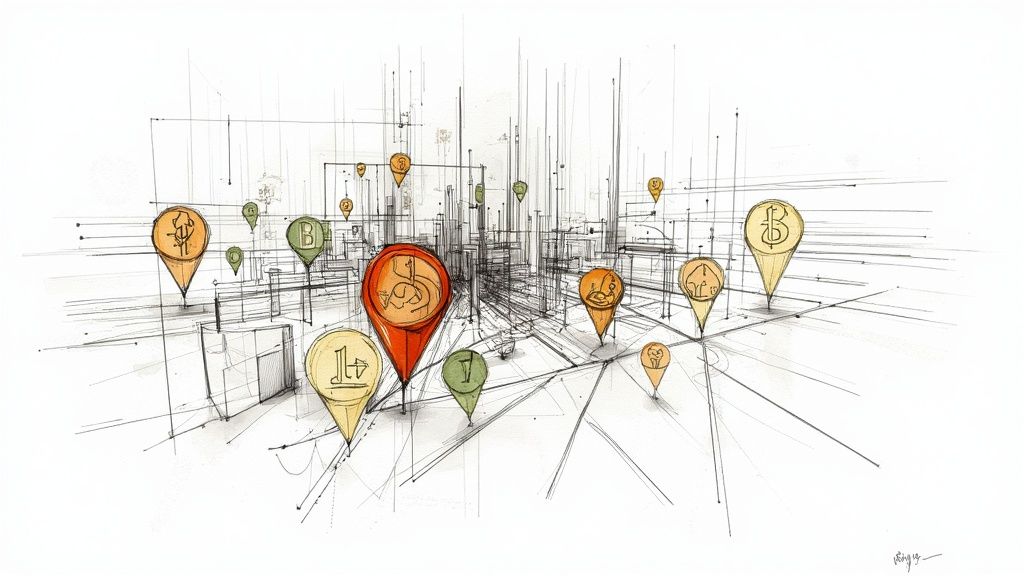
The way you present your coins can make or break a deal. It's not just about the coins themselves; it's about the story they tell. A neatly organised, well-cared-for collection immediately signals to a buyer that you're a serious collector who understands its worth. This builds confidence from the get-go and often leads to much stronger offers.
First things first, let's talk about the cardinal sin of coin collecting: do not clean your coins. I can't stress this enough. It is hands down the most common—and most costly—mistake a seller can make.
That layer of toning or tarnish you might see as grime is actually a natural patina that has taken decades, or even centuries, to develop. Collectors and dealers prize this originality. A quick polish with an abrasive cleaner will strip it away, leaving behind a network of tiny, unnatural scratches. This simple act can slash a coin's value by hundreds, sometimes thousands, of pounds in an instant.
Handle and Store Your Collection with Care
So, if you can't clean them, what should you do? The answer is simple: focus on proper handling and storage. The natural oils and acids on your fingertips can cause corrosion over time. Always, always handle coins by their edges. For your more valuable pieces, a pair of soft cotton gloves is a wise investment.
Good storage is equally critical. Those old cardboard folders or PVC-based plastic flips you might have lying around can contain chemicals that will actively damage your coins. It’s worth spending a little on archival-safe materials to protect your assets.
- 2x2 Cardboard Flips: These are an inexpensive and effective solution. They also give you space to write key details on the holder. Just be sure to use a flat-clinch stapler to avoid sharp staple ends scratching other coins.
- Archival Albums: Popping your graded flips into a proper album creates a professional, impressive presentation for when you decide where to sell your coin collections.
This small bit of effort not only protects your coins but also shows any potential buyer that you’ve looked after them properly.
Taking Pictures That Do Your Coins Justice
If you're looking to sell online or even just get an initial estimate from a dealer, high-quality photos are absolutely essential. A blurry, poorly-lit picture makes it impossible for an expert to judge a coin's true condition. They'll have to assume the worst, and their offer will reflect that.
You don't need a professional photography studio. Your smartphone, some good natural light, and a steady hand will do the trick.
Lay the coin on a plain, neutral background – a piece of white paper or dark felt works well. Try to use daylight from a window, but avoid harsh, direct sunlight as it creates glare. And whatever you do, turn off your camera’s flash.
Make sure you get clear, focused shots of both the front (obverse) and the back (reverse). If there are any important features, like a mint mark or a unique detail, take a close-up. An honest, detailed set of photos builds trust and is crucial for getting the best possible price.
Securing the Deal and Finalising the Sale Safely
You’ve put in the groundwork, prepared your coins, and picked out the best place to sell your collection. Now for the most important part: closing the deal. Whether you’re meeting a dealer face-to-face or handling a sale online, a bit of confidence and a healthy dose of caution are your best friends. This is where your preparation pays off.
Negotiating with a dealer doesn't need to be an intimidating experience. Just remember their first offer is exactly that—a starting point.
If it feels low, don’t hesitate to politely counter. You could say something like, "Based on my research of recent auction results for similar coins, I was hoping for something closer to £X." Having your inventory list and valuation notes on hand shows you’ve done your homework.
Crucially, you must be prepared to walk away. If a deal doesn’t feel right or the offer is consistently under a fair market price, just thank the dealer for their time and leave. The right buyer is out there.
Managing Online Sales Securely
Selling online demands an extra layer of diligence to protect both you and your valuable collection. A smooth transaction depends on secure processes from the moment of payment right through to delivery. Don't cut corners here; getting this wrong can be a costly mistake.
Your security checklist should cover these essentials:
- Secure Payment Methods: Always stick to a platform's integrated payment system, like PayPal Goods & Services or eBay's Managed Payments. Never agree to an off-platform deal like a direct bank transfer, as you’ll lose all your seller protection.
- Wait for Cleared Funds: Don't even think about shipping anything until the payment has fully cleared and is showing in your account. Scammers are notorious for using fake payment confirmation emails to trick sellers into sending items before any money has actually changed hands.
- Robust Packaging: Protect your coins properly for transit. I recommend placing them in padded envelopes and then inside a sturdy, plain box. Avoid any branding or labels that might hint at the valuable contents inside.
Protecting your sale is paramount. Using tracked, insured shipping isn't just a good idea; it's essential for peace of mind and financial security. It gives you proof of delivery and covers you in the rare event that something goes wrong in transit.
For valuable UK deliveries, Royal Mail Special Delivery is the gold standard. It offers complete end-to-end tracking, requires a signature on delivery, and provides the right level of insurance cover for valuable items like coins. For an in-depth look at this process, you can find more expert tips for maximizing your coin collection sale in our detailed guide.
By approaching the final sale with a clear strategy for negotiation and a strict protocol for online transactions, you ensure the whole process is not only profitable but also safe. This careful approach is the final step in successfully turning your collection into its true cash value.
Common Questions About Selling Coin Collections
When you're ready to sell a coin collection, a few questions always seem to pop up. It's completely normal. Getting some clear answers from the get-go can make the whole process feel much less daunting and help you sidestep some common blunders. Let's tackle a few of the queries we hear most often.
Should I Clean My Coins Before Selling Them?
The short answer is a resounding no. It's one of the biggest mistakes a new seller can make. That dark toning or layer of tarnish you see is a natural patina, developed over decades or even centuries. Collectors actually prize this as a sign of originality and undisturbed history.
Trying to clean coins, especially with abrasive chemicals or polishes, can cause irreversible damage to their surfaces. This can easily slash their value, sometimes rendering a valuable coin almost worthless.
If a coin is physically dirty—say, it has some loose soil on it from being discovered—the very most you should do is give it a gentle rinse in distilled water. After, pat it dry very softly with a microfibre cloth. Never, ever rub it. Honestly, it’s always best to leave any conservation to the experts or the final buyer.
Is It Better to Sell My Collection Whole or Break It Up?
This is a great question, and the answer really hinges on what's in your collection.
If you're sitting on a few standout, high-value coins, you will almost certainly get a better return by selling them individually. Specialist dealers or auction houses are the best venues for these. You'll find buyers who are willing to pay a premium for that one specific, rare piece they've been hunting for to complete their own set.
On the other hand, if you have a large collection filled with more common or lower-value coins, selling it as a single lot is often the most sensible and efficient route. This can be a very attractive proposition for a dealer who needs to build up their stock, or for a new collector looking for an instant start in the hobby. A professional appraisal can be invaluable here in helping you form the right strategy.
Key Takeaway: Selling rare coins individually maximises their value, while selling common coins as a complete lot offers efficiency and convenience. Assess your collection's highlights before deciding on your approach.
How Can I Avoid Scams When Selling Coins Online?
Selling online is convenient, but you absolutely need to have your wits about you. Sticking to reputable platforms with solid seller protection, like eBay, is your first line of defence.
Be immediately wary of any buyer who tries to convince you to communicate or handle payment outside of that platform. This is a classic red flag for a scam.
Always use a secure payment method that offers protection, such as PayPal Goods & Services. When it comes to postage, using a tracked and insured service is non-negotiable. In the UK, Royal Mail Special Delivery is the gold standard for valuable items. Most importantly, never, ever send your coins until the payment has fully cleared and is sitting in your account. Document everything—take clear photos of the coins and the packaging process just in case a dispute arises.
Do I Have to Pay Tax When I Sell My Coin Collection in the UK?
It’s definitely possible, and the rules can be a bit tricky. The good news is that UK legal tender coins, like gold Sovereigns and Britannias, are typically exempt from Capital Gains Tax (CGT).
For other coins that are not legal tender, you may owe tax if your total profit (the gain) from all assets you've sold in a tax year goes over the annual CGT exemption allowance.
Because this can get complicated, especially with a valuable or diverse collection, getting advice from a qualified tax advisor is a very smart move. They can give you clear guidance and ensure you stay on the right side of HMRC.
At Cavalier Coins Ltd, we provide a trusted platform for both buying and selling rare and interesting coins from around the world. Whether you are looking to sell a cherished collection or find the next unique piece for your own, explore our extensive selection and expert services at https://www.cavaliercoins.com.
